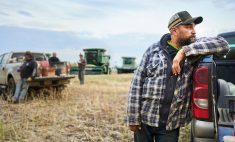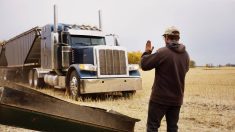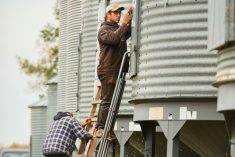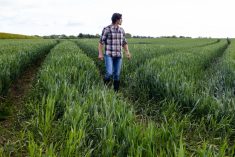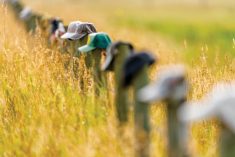Glacier FarmMedia — It’s no secret many farm and ranch operations facing the prospect of transition to the next generation feel stuck and unsure how to proceed.
“We can’t emphasize enough that retirement is a significant life transition that comes with a rollercoaster of challenges and emotions,” write Robert Laura and Colleen Drummond in the Modern Elder Academy newsletter. “Without the right time or place to process them, you’re setting yourself up for failure.” But the skills required to successfully navigate the retirement and transition process are not necessarily the same skills that built the business.
For many in the holistic management community, Don Campbell is considered a sage and leader. And nowhere is his experience more profound than in the field of succession or transition. At 80 years young, Campbell successfully navigated the process on his family’s ranch at Meadow Lake, Sask., and has assisted other families with their farm transitions.
Read Also

Note to subscribers: Planting a new seed for Grainews
Grainews now moves into The Western Producer as part of the farm newspaper’s new Farm Work section, providing Western Canada’s grain growers with one place to get the news and information they need.
He says there is nothing better than seeing kids excel and knowing the operation will be in excellent hands. He wonders, though, if this is the sticking point: is that a difficult perspective for some parents to take?
Parents, he says, must be willing to take the next steps. “There is a window of opportunity, and you have to act on that. If you pass by that window, change can be extremely difficult. There is an age when the kids want to take over and one should capitalize on that.”
Starting the transition
Campbell encouraged his kids to leave home for a few years when they turned 18, whether to pursue their education or to work for other people. This step created an important transition in the relationship from parent to partner.
When his oldest son, Scott, came back to the ranch, they hired him as the manager and drew up a contract — not a legal contract, he says, but one written in good faith by parents and son.
In his experience, Campbell says if a father is too dominant or hangs on too long, the kids won’t excel. Campbell is grateful for the opportunities his father gave him. He had total free rein and support from his dad, who told him, “Do what you think is best. I believe in you.”
He has tried to emulate this approach with his kids. He’s found that typically the senior member of the family business holds a lot of power during transitions — but the parents need to figure out how to let go. “You are not what you do and you need to separate the business from yourself,” says Campbell.
Like many ranchers and farmers, Campbell didn’t have much in the way of hobbies not directly tied to the ranch. But in their mid-50s, he and his wife Bev were intentional about starting a third career. The couple started teaching and facilitating holistic management courses and were away from the ranch for long stretches of time.
READ MORE: How to embrace a positive perspective for farm transition
Focusing on quality of life and not standard of living has long been an integral part of Campbell’s approach, one he demonstrated to his children as they grew up. Together with goal-setting and the decision-making framework of holistic management, he and his wife were confident their kids were good people making good decisions.
When working with other families, he always meets first with the parents to discover their goals and aspirations. After all, the estate currently belongs to them, and they’ll be making decisions for the foreseeable future. Next, he meets with the incoming generation — both farming and non-farming, if appropriate — to bring it all together.
There’s a major emphasis on communication and family meetings because Campbell says good communication is vital. He points to wills as an example. “People get hurt when they don’t know what is in the will.”
He says what’s in the will isn’t as important as the act of telling people what’s in the will. Imagine a farming child who assumes they will inherit the farm, only to discover after their parents pass away that they own one-third of it, with two non-farming siblings owning the rest. The will needs to match the business plan and the plan should always start with the people before moving to the financial and legal components.
The next stage in the transition process involves the professionals, but Campbell says the family first needs to come up with its own vision of what the future looks like. Then they can ask the accountants and lawyers about the “how-tos” to get there.
Campbell is emphatic about hiring a good facilitator. “A good facilitator can move the process from emotional to rational, which is critical.” One instance where a facilitator can be invaluable is when developing an exit clause before entering into a business agreement. “It is vital to create an exit clause at the same time as the agreement. This is an excellent example of how a facilitator can help.”
And, he adds, don’t think this will be a one-off event. In his experience, it takes an average of five years to put a good succession plan together.
Exercises for farm transitions
Noel McNaughton of Edmonton also has plenty of succession journey experience. His varied career has focused mostly on farm management and his insight into life’s transitions, particularly for men, adds an important dimension to farm or ranch transitions. He agrees with Campbell that it’s important for individuals to avoid confusing who they are with what they do. “I have met people in all walks of life, including farming and ranching, who at mid-life have suddenly lost interest in what has been to that time a passionate lifelong career. This mid-life change can really throw you for a loop and it can happen to you.”
He draws inspiration from Buddhism to help people figure out who they are without their farm. Zen philosophy espouses that anything owned is already either broken or gone. This helps people to not cling to possessions or occupations — so when the thing is eventually broken or gone, there is little stress because it was “already gone when you got it.”
With that philosophy in mind, McNaughton compiled his weekly columns into a book, including advice and exercises for spouses or the whole family. One exercise asks the readers to assume that they have already sold their farm and to write down what they want to be, do and have in their life, whether they own a farm or not.
Here are a few sample questions to get started:
• What do I love about the farm?
• Under what other circumstances can I get that?
• What would I love to do, but can’t, because I am on a farm?
“I talked to literally thousands of farm and ranch families over the years, most of whom hope at least one of their children will be interested in taking over the farm. But the men don’t want to let go of control, and it won’t work any other way,” McNaughton says.
“If you are hoping one of your kids will want to take over the farm or ranch, you must do a few things. Start by giving the child at least one enterprise of which he or she is totally in charge. When a feed salesman or buyer calls, tell them to talk to your son or daughter who makes all the decisions. Have regular meetings — weekly is best — and do more listening than talking. Make a working agreement and succession plan, in writing, with dates for when you will turn over full control of the operation and start enjoying your retirement.”
Once a transition outline has been developed McNaughton suggests finding ways to help your son or daughter become a successful manager.
“And don’t wait until they are 50 and you are old and decrepit. If you simply have to be in charge all the time, pray none of your kids will be dumb enough to try ranching with you — and get some therapy.”
Reshaping retirement
No matter how healthy and vibrant someone is, their energy level will decline over time. “The question is, which lies about aging do you believe, and how is it affecting your picture of the future? If you are over 50, are you preparing for takeoff, or landing? The conventional concept of retirement in itself is a picture of idleness and decline,” McNaughton says.
An alternative term, he says, is “redirection of energy.” It has more positive connotations and includes finding new ways to contribute to the community.
“If you are your business — for example, you are an actor, professional speaker, or maybe a chef — you may not be able to have someone else run it for you,” he says. “But if you are producing things, as a ranching business does, you can take a break, and you may find it very worthwhile. Business owners who get away for a significant period often come back with renewed energy and a new perspective that allows them to run their operations with more creativity and less physical work.”
McNaughton also recommends asking, “What projects are you interested in that farming has kept you too busy to pursue? Are you getting ready to take off on your next big venture in life, or preparing to come in for a landing? If you are feeling worn out from the struggle of making a living on the farm, and planning on retiring, definitely leave time for an extended period of rest. But don’t plan on making it a lifestyle, as you may become bored and disheartened. If you believe society’s lies about aging, you may think you can’t do anything else, but it is never too late to set out on a new adventure.”
As the old saying goes, “Don’t put off until tomorrow what you can do today.” Use this article as a jumping-off point to start the conversation. Emphasize to your family or team that the process will take time. There will be challenges — but don’t underestimate the potential benefits.




